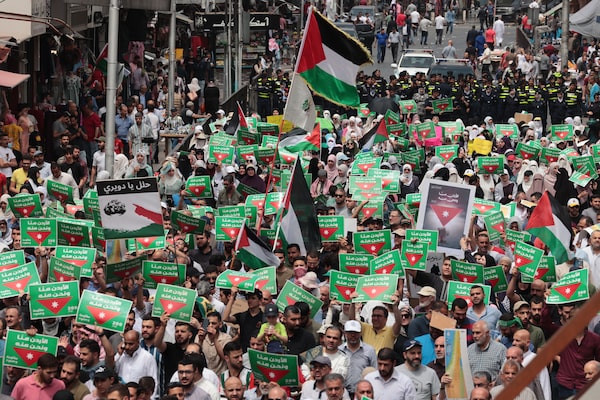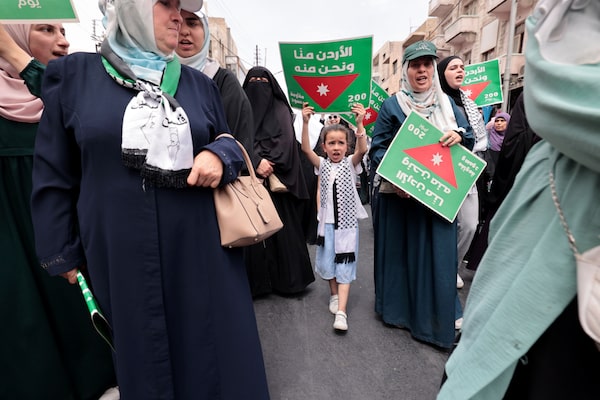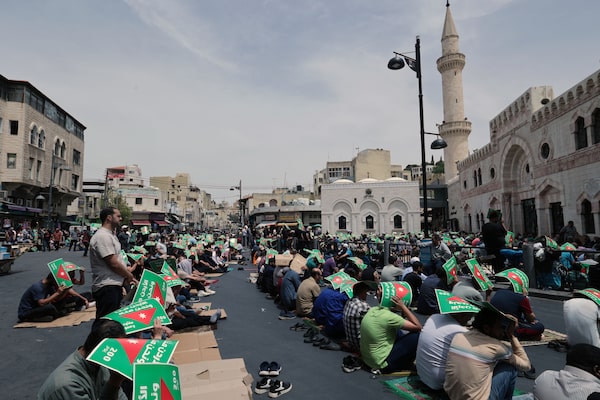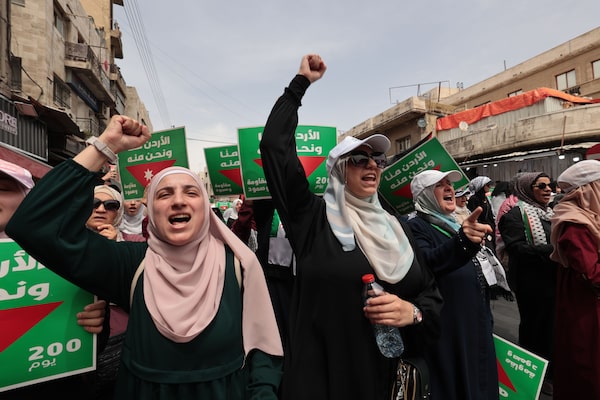
Jordanians protest after Friday prayers near Al-Husseini mosque in the capital Amman, on April 26.Salah Malkawi/The Globe and Mail
Khalid Assem cheered when he saw the Iranian missiles streaking over his home in the early hours of April 14, headed toward targets in Israel. Then his heart fell as Jordanian air defences began shooting the rockets out of the night sky.
The 19-year-old was born in Jordan and lives in Amman, but he considers himself Palestinian, since his ancestors were driven from their home near Jerusalem by the 1948 war that followed the creation of Israel. Mr. Assem, like many young Palestinians and Jordanians, has been watching with escalating anger for more than six months as the death toll from Israel’s war in the Gaza Strip has risen past 30,000. Israel’s military campaign is aimed at destroying Hamas and rescuing the hostages the Iranian-backed group took during an Oct. 7 attack, which left more than 1,100 people dead.
Mr. Assem said he and his friends get most of their information about the war from Palestinian journalists posting on Instagram. To them, the April 14 Iranian attack – even though most of the 300-plus missiles and drones it launched were intercepted – was laudable because it was the first time another country had tried to hit at Israel since the war in Gaza began.

Rallies against the war in Gaza have brought together groups who would otherwise have little in common, such as the left-wing Labor Party and the Muslim Brotherhood.Salah Malkawi/The Globe and Mail
He was less pleased by the Jordanian response. “It’s not good that they were defending people we want to see killed,” he said, showing off the metre-wide patch of dark new cement that covers the spot in front of his house in the Marj al-Hammam neighbourhood of Amman where part of an Iranian missile crashed after being shot down.
That anger at the country’s government, many in Jordan believe, is exactly what Iran was trying to provoke by firing missiles and drones via Jordanian skies, rather than sending them over Syria, an Iranian ally that would most certainly not have intercepted them. Some see the decision to violate Jordan’s airspace as signifying the opening of yet another proxy conflict in the region – this one aimed at destabilizing Jordan, a country that both has a peace treaty with Israel and hosts U.S. military bases.
Analysis: Israel and Iran’s shadow war breaks out into the open
“If they really wanted to hurt Israel, Iran is already based in Lebanon and Syria and can do this easily,” said Amer al-Sabaileh, who writes on geopolitics for the Jordan Times newspaper. “In my opinion, the idea was to violate Jordanian sovereignty and make Jordan a corridor in this war.”
Jordan’s move to shoot down the Iranian projectiles – which the government says was a straightforward decision to protect the country’s airspace – has been portrayed by Iran as the Hashemite Kingdom revealing itself as a protector of the Jewish state. Photoshopped images of Jordan’s King Abdullah II wearing an Israeli military uniform quickly appeared on Arabic-language social media, and Iranian state media warned that Jordan could be “the next target.”
That rhetorical escalation was followed by Hamas calls for protests in Amman and in the Palestinian refugee camps located in the country. Even more disconcerting was a statement by the Iraq-based Kataib Hezbollah, a militia funded by Tehran, saying it was ready to provide weapons to up to 12,000 Jordanians “so that we can stand united in defending our brothers in Palestine.”

Protesters sit in the street to hold a space beyond the full mosque during Friday prayers.Salah Malkawi/The Globe and Mail
Zaid Eyadat, director of the Centre for Strategic Studies at the University of Jordan, said he believed Iran was attempting to establish a militia in Jordan – akin to Hezbollah in Lebanon, Kataib Hezbollah in Iraq and the Houthis in Yemen – and create another front in its increasingly open war against Israel.
“I’m certain they will never succeed, but the fact they are trying to do this should be taken seriously,” he said. “There is a growing perception inside Jordan that the Iranian threats are no longer an empty shell.”
The charge of having defended Israel – at a time when Arab-language TV stations are telling their audiences that Israel is carrying out an intentional genocide in Gaza – is particularly inflammatory in Jordan, where somewhere between a quarter and half of the country’s population of 11 million is of Palestinian descent. The Hamas calls for protest were noteworthy in how they separately addressed the country’s Palestinian population and its Jordanian tribes, spotlighting a divide that is rarely discussed in public here.
The Hamas statements were followed by fresh protests in Amman this week, including on Friday when several hundred Muslim Brotherhood supporters marched through the city centre, chanting their support for Abu Obaida, the spokesman for Hamas’s military wing. While secular Jordanian parties have joined previous protests that have been much larger in size, only the Brotherhood – which has long-standing links to Hamas – appeared to take part in Friday’s demonstration, which was heavily monitored by police.
Rula Alhroob, the secretary-general of Jordan’s Labor Party, which has taken part in some of the larger protests, said the Palestinian issue and opposition to Israeli actions in Gaza unite segments of Jordanian society that otherwise have little in common – such as the Muslim Brotherhood and her own small left-wing party.
“When it comes to local affairs, there’s a big difference between us and the Islamists, but when it comes to Palestine, we support resistance,” she said. Ms. Alhroob said that while the Brotherhood was the largest political group taking part in the protests, 80 per cent of the protesters at the larger demonstrations belonged to no party at all.
Ms. Alhroob said economic pressures – the World Bank last year reclassified Jordan from an “upper-middle income” country to “lower-middle income” – were contributing to the sense of anger and helplessness that people felt while watching images from Gaza. There was increasing unhappiness, she said, with Jordan’s 1994 peace treaty with Israel, which was supposed to deliver economic prosperity to Jordan and help pave the way to a Palestinian state.
“It’s no wonder that the people might explode,” she said in an interview before Friday’s protest. “You cannot expect when it will happen, you cannot say they will explode at a certain point in time.”

Jordanians are angered by what they see as their government's defence of Israel.Salah Malkawi/The Globe and Mail
The country’s pro-Western monarchy – which rules through its heavy handed mukhabarat internal security service – has managed to maintain stability through a series of wars and crises on its borders over the past 76 years. But Prof. Eyadat said the current unrest posed a unique danger because it risked splitting the country along Jordanian-Palestinian lines.
“There is a minority in Jordan – likely Muslim Brotherhood and mainly of a Palestinian background – that have always felt that Jordan is not defending their interests and accuse it of defending Israel’s,” Prof. Eyadat said. “But I think what is worrying is there are some public figures – journalists and writers and activists – who were provided with space to express their opinions over the past six months, that are aligning with the Muslim Brotherhood and adapting the Iranian narrative.”
Opinion: The Israel-Hamas war has unleashed a security crisis for neighbouring Jordan
Analysts say the conflict between Jordan and Iran was veering into violence even before the April 14 attacks. In December, a clash between the Jordanian army and smugglers based in Syria escalated into a 14-hour battle. In the aftermath, the Jordanian army said it had captured not only large amounts of crystal meth and Captagon, a synthetically produced amphetamine, but also automatic weapons, rocket launchers and missiles. In January, Jordan’s air force reportedly carried out cross-border air strikes into Syria, again targeting smugglers.
Mr. al-Sabaileh said Lebanon’s Hezbollah, which controls and profits from a drug-smuggling network that traverses Syria and Jordan, was attempting to move fighters and weapons into Jordan and onward to the Israeli-occupied West Bank. Israel has reported intercepting more than 1,000 weapons of various sizes that were smuggled across the Jordanian border over the past two years.
Mr. al-Sabaileh said he was worried that Jordan – despite its renowned security services – was vulnerable to a large-scale destabilization campaign. “Our borders with Iraq and Syria have turned to be a serious source of threat,” he said, referring to Iranian-backed groups in both countries. “The next phase could be lone-wolf attacks against sensitive places, and psychologically turning your people against you. This is what I can see from what is happening, this is the Iranian plan.”
Back in Marj al-Hammam, some hope that April 14 attack – and a restrained Israeli counterattack a few days later, which has been downplayed in Iranian media – would mark the end of the attempts to involve Jordan in the widening conflict.
“We hope so – but in my opinion, this could happen again,” said Mahmoud Tarawneh, a 42-year-old engineer, showing where the fence outside his home was damaged by shrapnel during the attack. “Jordan is stable. But Iran is not stable and Israel is not stable – and we are in the middle.”
Editor’s note: This article has been updated to correct Abu Obaida’s title as spokesperson for the military wing of Hamas.
 Mark MacKinnon
Mark MacKinnon